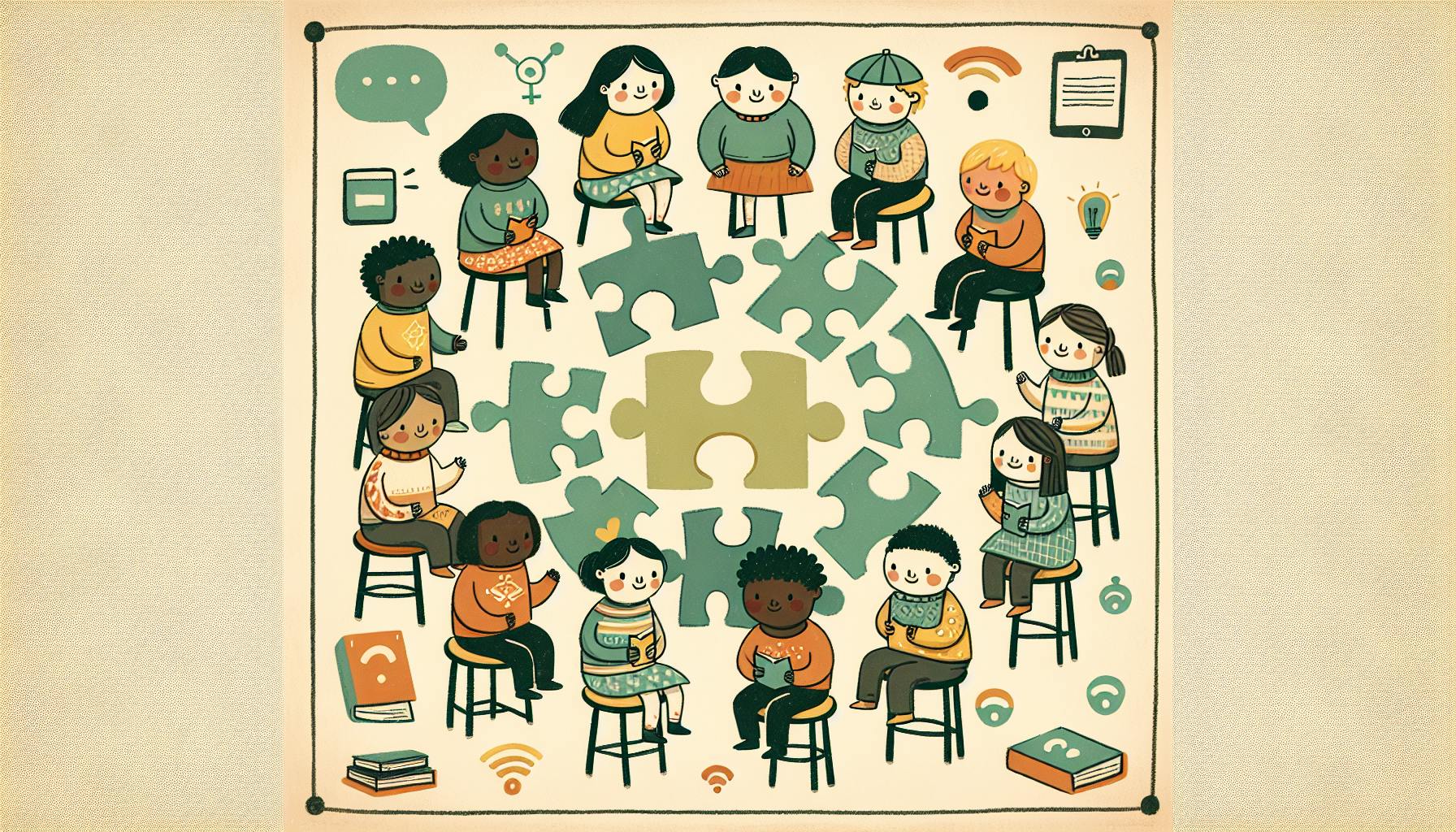Finding engaging reading activities for 4th graders can be a challenge for educators.
This article provides a curated list of the best reading games and resources to make teaching 4th grade literacy fun and effective.
You'll discover interactive online games, printable board games, and easy-to-implement classroom activities to boost your students' reading skills and comprehension.
Introduction to Reading Games for 4th Grade
Reading games can be a fun and engaging way to help 4th grade students build essential literacy skills. When selected thoughtfully, they reinforce reading strategies, build vocabulary, and offer meaningful practice with comprehension, all while keeping students motivated to learn.
This article provides a curated list of the best reading game resources for 4th grade classrooms, focusing on ease of use and effectiveness based on learning outcomes.
Unlocking the Potential of Reading Games for Kids
Game-based learning taps into students' natural motivation and sparks active engagement. Well-designed reading games apply key strategies like close reading, repeated practice, and immediate feedback. This helps cement concepts and skills for 4th graders in an enjoyable format.
Research shows game-based learning improves reading achievement, fosters collaboration, and empowers students to take ownership of literacy goals. With a teacher's guidance, games turn skill-building into a rewarding quest. Students level up literacy abilities without even realizing it.
Criteria for Selecting the Best 4th Grade Reading Games
Effective reading games share essential traits to amplify learning:
- Align to standards: Quality games target Grade 4 Common Core standards for literature analysis, comprehension strategies, vocabulary building, and more. This ensures games support curriculum goals.
- Build reading skills: The best games move beyond basic drill and practice to reinforce effective strategies like visualizing, asking questions, summarizing, etc. This helps students tackle complex texts.
- Provide actionable data: Games yield reports on trouble spots so teachers can personalize instruction. This is key for differentiation and Response to Intervention (RTI).
- Engage and reward: Games motivate through friendly competition, badges, avatars, rewards and more. This intrinsic motivation leads students to put in more practice.
- Offer differentiated activities: Leveled games adapt to learner needs for an optimal challenge. This builds confidence and keeps advanced students stretching their skills.
The reading games featured next check all these boxes, making them teacher-approved for the 4th grade classroom.
What to teach 4th graders in reading?
Teaching 4th grade reading can be challenging, but also very rewarding. Here are some key reading skills and concepts to focus on with your 4th grade students:
Vocabulary Development
- Teach students how to use root words, prefixes, and suffixes to determine the meaning of unfamiliar words
- Incorporate antonyms, synonyms, homonyms, and idioms into lessons to build breadth of vocabulary
- Use analogies to help students grasp word relationships and nuances
Reading Comprehension
- Work on interpreting words with multiple meanings by providing text examples
- Improve comprehension of fiction and nonfiction through close reading strategies
- Teach students to summarize key details and identify main ideas
- Use graphic organizers to help students understand text structure
Fluency
- Set goals for words per minute targets tailored to each student
- Incorporate repeated readings and paired readings to promote fluency
- Focus on proper phrasing, intonation, and expression
The key is providing a balanced literacy approach. Mix whole group, small group and independent reading activities. Monitor progress with assessments and adjust instruction accordingly. Most importantly, instill a lifelong love of reading!
How do I get my 4th grader interested in reading?
Here are some effective tips to encourage 4th grade students to read more and hopefully build a lifelong love of reading:
Make Reading Enjoyable
- Let students pick books they are interested in - this gives them more control and investment in the reading material. Genres like mystery, adventure, and fantasy are often good places to start.
- Reread favorite books - familiar stories are comforting and help reinforce vocabulary.
- Play audiobooks to model fluent reading. Students can follow along in the physical book.
- Do different silly voices for book characters to bring stories to life.
- Occasionally read aloud together as a family.
Connect Reading to Real Life
- Choose books related to your child's hobbies and interests. Non-fiction books about sports, animals, space etc. allow them to read about their passions.
- Before going on vacation, read a relevant book to get your child excited about what they will see and do. Refer back to the book as you experience activities from the story.
- Read articles and websites related to TV shows or movies they enjoy. Seeing reading as an extension of entertainment makes it more appealing.
Make it a Habit
- Set aside DEAR (Drop Everything And Read) time every day for the whole family to put aside distractions and read independently.
- Bring books or magazines anytime you may have to wait, like at appointments, restaurants, or in the car. Having reading material handy prevents boredom.
- Make weekly trips to the library for book checkouts a fun routine. Let your reader explore and take ownership of checking out their books.
Engage Deeper with Stories
- Occasionally pause during read alouds to ask questions about what is happening in the story and why.
- Have your child retell main story events to you in their own words.
- Discuss vocabulary words and their meanings.
Making reading enjoyable while showing your 4th grader that reading is fun and useful can instill daily reading habits.
What should a fourth grader be able to read?
Your fourth grader should continue spending time reading both literature (stories, plays, and poetry) as well as nonfiction (history, science, social studies). Expect the content and language in these texts to challenge your student.
Here are some key reading milestones for fourth graders:
- Read grade-level books and texts independently
- Understand figurative language like metaphors and similes
- Summarize texts by identifying main ideas and supporting details
- Make inferences and draw conclusions based on evidence in the text
- Compare and contrast stories with similar themes or plots
To help your fourth grader meet these goals, provide a mix of fiction and nonfiction texts at their reading level. Short stories, novels, magazines, websites, and more will all help build key comprehension skills. Support their reading growth by asking questions about what they've read and discussing vocabulary or confusing passages. With the right balance of challenge and support, your fourth grade reader will continue to blossom!
What activities do 4th graders like?
Fourth grade is an exciting time when students' reading skills and interests really start to expand. When looking for reading games and activities for 4th graders, it's important to find options that are engaging and align to their developing abilities.
Here are some of the most popular and effective reading games and activities for 4th grade students:
- Interactive online games: Educational websites like ABCya, Funbrain, and ReadWorks offer a huge variety of free online reading games that allow students to practice skills like comprehension, vocabulary, and grammar in an interactive format. These build enthusiasm for reading while letting kids work at their own pace.
- Escape rooms: Turn your classroom into an escape room with reading-based puzzles and clues. Students must apply reading strategies like making inferences and analyzing text structure to "break out" of the room. This builds teamwork and problem-solving too.
- Literature circles: Small student-led book clubs encourage meaningful discussion and analysis of novels. Students take ownership of their reading and build comprehension through reader response journals, role sheets, and collaborative conversations.
- Reader's theater: Students rehearse and perform scenes from books, often with props and costumes. This boosts fluency and public speaking confidence while making reading fun. Short skits can even be recorded as videos.
- Vocabulary games: From Apples to Apples to taboo-style games, friendly competition builds vocabulary. Students gain exposure to new words in context and can even design their own vocab games.
The key is balancing skill-building with engagement. When students are having fun reading, their skills will naturally improve over time. Interactive games, group activities, friendly competition, and performance elements are great ways to get 4th graders actively excited about reading.
sbb-itb-bb2be89
Interactive Reading Games for 4th Grade Online Free
Interactive reading games can provide engaging and effective ways for 4th grade students to build essential literacy skills. When selected thoughtfully, online reading games offer opportunities for adventure-based learning, targeted skill practice, and vocabulary expansion. This section recommends free online reading games for 4th graders in the following categories:
Adventure-Based Reading Games for 4th Grade Online
Online adventure games immerse students in exciting stories and quests that require the use of reading comprehension strategies. As the narrative unfolds, students must answer reading comprehension questions correctly in order to advance the story. Recommended free adventure-based reading games include:
- Gumshoe Grammar from ReadTheory - Students take on the role of a detective solving mysteries using grammar knowledge.
- Bookopolis from ReadWorks - Journey through famous literature while answering reading comprehension questions.
- Nessy Adventures from Nessy.com - Embark on an adventure to save the lost island of literacy. Questions target phonics, vocabulary, fluency and comprehension.
These narrative-style games transform reading skill practice into thrilling adventures that capture student interest and imagination.
ABCya Grade 4: Fun Learning Games
ABCya's collection of over 400 online learning games includes activities designed specifically for 4th grade ELA standards. Students can practice standards-aligned skills in reading, writing, speaking and listening with games such as:
- Rags to Riches - Choose the correct meaning of words and idioms.
- Word Scramble - Unscramble words related to 4th grade topics.
- Text Twist - Form words from jumbled letters against the clock.
ABCya makes learning fun and engaging with interactive games that reinforce 4th grade literacy skills.
Vocabulary Expansion with Online Word Games
Online word games offer playful ways for students to expand their vocabulary. Games focused on synonyms, antonyms, and homophones help cement new words and their meanings. Recommended free vocabulary games include:
- Homophone Hop from Turtle Diary - Choose the correct homophone to complete sentences.
- Antonym Antics from Super Teacher Tools - Match words to their antonyms against the clock.
- Synonym Scramble from Kids Academy - Unscramble words and match them up with synonyms.
These quick, game-based vocabulary exercises help students gain fluency with a wider range of words. Online word games make vocabulary practice entertaining and impactful.
With a vast range of free literacy games available online, teachers can easily incorporate interactive reading activities into 4th grade ELA instruction. Adventure quests, skill practice games, and vocabulary challenges engage students as they build essential reading and language arts skills.
4th Grade Computer Game Resources for ELA Test Prep
Computer games can be a fun and engaging way for 4th grade students to build skills for English Language Arts (ELA) test preparation. When selecting games, teachers should look for ones that align to Common Core standards and incorporate reading strategies, grammar skills, vocabulary development, and text structure analysis.
Grammar Mastery with Interactive Games
Incorporate games that allow students to practice grammar and parts of speech in an interactive format. Games centered around identifying parts of speech, using proper punctuation, fixing sentence fragments, and diagramming sentences can reinforce grammar skills. Useful game types include:
- Sentence unscrambling or sequencing
- Punctuation games (comma use, quotation marks, etc.)
- Parts of speech identification games
- Grammar mistake identification challenges
These games present grammar concepts in bite-sized pieces to help cement understanding.
Close Reading and Text Structure Games
Close reading requires students to analyze texts in detail, making inferences and drawing conclusions. Games focused on comprehension, inference, summarizing, and analyzing text structure provide good test prep. Useful games include:
- Sequencing events from a passage
- Matching descriptive details to the correct part of a text
- Identifying the main idea and supporting details
- Comparing and contrasting multiple texts
- Recognizing different text structures like cause/effect, problem/solution, chronological order, etc.
These games allow students to practice close reading on literary and informational texts.
Test Preparation Through Reading Strategy Games
Standardized ELA tests evaluate skills like making inferences, determining meaning from context, and analyzing author's purpose. Games centered around reading strategies like:
- Using context clues to determine word meaning
- Making predictions and confirming accuracy
- Identifying author's purpose and point of view
- Distinguishing fact from opinion
help reinforce skills needed for testing success. Games allow students to apply reading strategies in an engaging, low-stakes environment.
Computer games can make skill-building for ELA testing more motivating and interactive. Games that align to standards provide structured practice opportunities in an enjoyable format for students.
Printable Reading Games for 4th Grade
Teachers can utilize a variety of printable resources to make reading instruction more engaging and effective for 4th grade students. These materials allow for differentiation, collaboration, and opportunities to practice key reading skills.
Task Cards for Comprehension Practice
Task cards provide a simple way to differentiate and offer targeted practice. Teachers can use reading comprehension task cards for 4th graders to:
- Provide quick formative assessment
- Offer choice to enhance engagement
- Allow students to work independently or collaboratively
- Cover standards like main idea, inferencing, summarizing, etc.
Printable task card templates make creating sets easy. Assign cards based on skill level or student interest. Include fiction and nonfiction focused cards to build understanding across genres.
Informational Text Analysis with Board Games
Board games build enthusiasm for practicing informational text skills like:
- Identifying key details
- Understanding text structure
- Drawing conclusions
- Comparing accounts on the same topic
Print and play board games that reinforce these critical analysis skills. Or have students create their own games using informational articles or videos. Playing collaboratively deepens comprehension through discussion.
Literature Circle Printables for 4th Grade
Literature circles allow for student-led analysis of narrative text. Print role sheets to provide discussion guidance:
- Discussion Director: Develops questions
- Connector: Finds links to own experience
- Illustrator: Creates visual representations
- Word Watcher: Examines vocabulary
Printable role badges, reading logs, and reflection forms facilitate implementation. Choose rich grade-level texts and form groups. Literature circles empower students to lead the comprehension process.
Using a variety of printable manipulatives engages 4th graders in the reading process. Print games, task cards, role sheets, and more to differentiate and make learning standards-based skills more motivating and meaningful.
4th Grade Reading Comprehension Games for the Classroom
Engaging students with reading comprehension games designed specifically for the 4th grade classroom can greatly improve their literacy skills and motivation to learn. As an educator, integrating these activities into your lesson plans encourages participation, healthy competition, and makes learning fun.
Reading Centers: Rotating Reading Games
Create dynamic reading centers that students rotate through, each featuring a different reading game catering to various learning styles and reading levels. Some ideas include:
- Interactive eBooks: Students read leveled eBooks and answer comprehension questions digitally. The immediate feedback helps reinforce skills.
- Board Games: Small groups collaborate playing reading-focused board games that build vocabulary and reading strategies. Popular options are Sequence, Apples to Apples, Quiddler, and Bananagrams.
- Literacy Task Cards: Students work through different task card activities like sequencing events, comparing texts, making inferences, decoding vocabulary, and more based on their reading level.
- Digital Games: Fun, level-appropriate reading games like Word Wagon, Storybird, and Squiggle Park reinforce skills through online interactivity and feedback.
Incorporating Reading Activities into Daily Lessons
Integrate these reading-focused games and activities into your English Language Arts plans to maintain engagement:
- Begin each day with a short, fun vocabulary review game like Scattergories or $10,000 Pyramid.
- Break up lessons with quick context clues activities like Guess the Word or Fill-in-the-Blank sentences.
- End classes with a reading comprehension game like Jeopardy, Kahoot, Quizlet Live, or Quizizz for review.
Classroom Competitions with Comprehension Challenges
Friendly reading comprehension competitions motivate students to apply skills:
- Literacy Escape Rooms: Students collaborate using reading strategies to solve puzzles and 'escape' the room.
- Battle of the Books: Separate into teams and quiz each other on details from classroom reading selections.
- March Madness Readers: Students work through reading brackets to see who can comprehend passages the fastest.
Implementing these reading-focused games keeps 4th graders engaged in building essential literacy skills!
Conclusion: Enhancing 4th Grade Literacy with Reading Games
Using the curated list of reading game resources in this article, 4th grade teachers can save valuable time finding effective tools to improve reading comprehension and engagement in their ELA instruction. Here are some key takeaways:
- Online reading games like Abcya provide engaging 4th grade reading activities to reinforce literacy skills. These games offer adaptive challenges to students at their reading level.
- Printable reading skill task cards from sources like Teachers Pay Teachers are easy to implement during reading centers or test prep. They cover reading standards like parts of speech, synonyms, antonyms, etc.
- Using CommonLit or Newsela for informational texts and passage sets allows differentiation and reading level adjustments. Their text sets and question sets save time in finding quality 4th grade reading materials.
- Fun reading games like Quizlet Live leverage friendly competition to motivate students to master 4th grade vocabulary, grammar, and comprehension standards.
Integrating these engaging, standards-aligned reading games and resources into 4th grade ELA lessons is an effective way to enhance literacy skills essential for future academic success.



